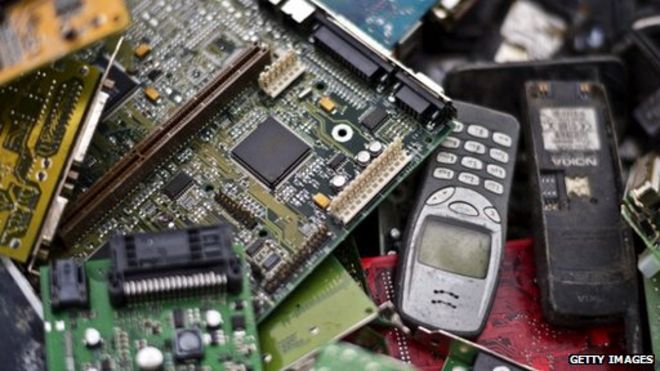E-waste rising dangerously in Asia: UN study

Electronic waste is rising sharply across Asia as higher incomes allow hundreds of millions of people to buy smartphones and other gadgets, with serious consequences for human health and the environment, according to a UN study released Sunday.
So-called e-waste in Asia has jumped 63 percent in five years, the report by the United Nations University said, as it warned of a need for most nations across the region to improve recycling and disposal methods.
"For many countries that already lack infrastructure for environmentally sound e-waste management, the increasing volumes are a cause for concern," said Ruediger Kuehr, the report's co-author and head of the UN University's Sustainable Cycles Programme.
For many years, China and some other parts of Asia have been a dumping ground for discarded electronics from the developed world, recycling the waste in often unsafe but ultracheap backyard factories.
But the report said that in recent years, Asia has rapidly emerged as a major source of electronic waste, due to increasingly affluent consumers buying items such as phones, tablets, refrigerators, personal computers and televisions.
China more than doubled its own generation of e-waste between 2010 and 2015, the period of the study, according to the report.
Per capita the worst-offending economy in the region was Hong Kong, with each person in the Chinese territory generating an average of 21.7 kilograms (47.8 pounds) of e-waste in 2015.
Singapore and Taiwan were also big e-waste dumpers, with just over 19 kilograms per person generated in 2015, according to the study.
Cambodia, Vietnam and the Philippines were among the lowest e-waste generators with an average of about one kilogram for each person.
Meanwhile, improper and illegal e-waste dumping means increased exposure to extremely toxic chemicals, leading to severe health and environment consequences.
Acids that are used to separate the metals in the electronic products are a particular concern, with inhalation or exposure to them causing serious health problems.
In the Chinese town of Guiyu, which built its economy on recycling waste from overseas, heavy metal contamination has turned the air and water toxic, according to a 2014 study by researchers at Shantou University Medical College.
Children in the town also had high lead levels in their blood, the university study found.
When an AFP team visited Guiyu in 2014, electronic remnants were strewn in a nearby stream, and the air was acrid from the burning of plastic, chemicals and circuit boards.
Article Source: http://www.terradaily.com/reports/E-waste_rising_dangerously_in_Asia_UN_study_999.html
Image Source: http://ichef.bbci.co.uk/news/660/media/images/82389000/jpg/_82389059_484913451.jpg
VOCABULARY WORDS:
Consequence (n.) ~ a result or effect of an action or condition
Affluent (adj.) ~ (especially of a group or area) having a great deal of money wealthy
Severe (adj.) ~ (of something bad or undesirable) very great intense
Contamination (n.) ~ the action or state of making or being made impure by polluting or poisoning
Acrid (adj.) ~ having an irritatingly strong and unpleasant taste or smell
QUESTIONS FOR DISCUSSION:
What is the main reason for the increase on the amount of electronic waste generated in Asia?
Is electronic waste disposal a problem in your country? How do you dispose the electronic gadgets that you don't use anymore?
Give suggestions on how to minimize electronic waste.